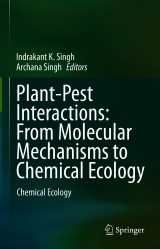Details

Plant-Pest Interactions: From Molecular Mechanisms to Chemical Ecology
Chemical Ecology|
213,99 € |
|
| Verlag: | Springer |
| Format: | |
| Veröffentl.: | 18.01.2021 |
| ISBN/EAN: | 9789811524677 |
| Sprache: | englisch |
Dieses eBook enthält ein Wasserzeichen.
Beschreibungen
<p>As food producers, plants are constantly under attack by insects. Over the course of evolution, plants have not only developed a sophisticated defense apparatus but have also refined biochemical defense mechanisms to protect themselves, thereby maintaining the ecological balance. Plant-pest interactions induce an elaborate array of reactions involving the release of volatile compounds, effector and signaling molecules, trans-membrane proteins, and a variety of enzymes and hormones. <br></p><div><div><br></div><div>This book offers a comprehensive guide to the strategies that plants employ against insects and other pests to ensure their continued survival. Addressing an important gap in the literature, it shares the latest findings in the field of plant–pest interactions for a broad audience. Providing an overview of the current state of knowledge on plant-pest interactions and their role in the genetic improvement of crops, it offers an essential guide for researchers and professionals in the fields of agriculture, plant pathology, entomology, cell biology, molecular biology and genetics.</div></div><div><br></div><p></p>
1. Role of Herbivore-Associated Modulator Patterns (HAMPs) in Modulating Plant Defences.- 2. Transcriptomics studies revealing enigma of Insect-Plant interaction.- 3. Plant-Insect Interaction: A Proteomic approach in Defense Mechanism.- 4. Role of miRNA in plant defense against insects.- 5. Role of MAPKs during plant insect interaction.- 6. Thioredoxins as molecular players in plants, pests and pathogens.- 7. Plant volatiles and their role in insect olfaction.- 8. Direct and indirect defense against Insects.- 9. Signalling during Insect-Plant interaction.- 10. Role of Phytohormones in Plant defense against Insects: signalling and crosstalk.- 11. Plant proteinase inhibitor and protease Interactionduring Insect-Plant communication.- 12. Natural insecticidal proteins and their potential in future IPM.- 13. Deciphering the role of phytoanticipins, phytoalexins, and polyphenols in plant-insect defense.- 14. Microbial influence on plant-insect interaction.- 15. Microbe-plant insect Interactions: A Comparative dissection of Interactome.- 16. Simplified perspective of complex Insect-plant interactions.- 17. Molecular, biochemical aspect of Insect-Plant Interaction: A perspective for pest management.- 18. Molecular, biochemical aspect of Insect-Plant Interaction: A perspective for pest management<br><div><div><br></div></div><div><br></div><div><br></div>
<div><b>Dr. Indrakant K. Singh</b> received his Ph.D. in Zoology from the University of Delhi (DU) and is currently working as an Assistant Professor at the Department of Zoology, Deshbandhu College, University of Delhi. He has received a Young Scientist Award from the SERB, Ministry of Science and Technology, Govt. of India; a Raman Post-Doctoral Fellowship from the MHRD, Govt. of India; a Max Planck Fellowship from the Max Planck Society, Germany, etc. Dr. Indrakant has published his research in prominent peer-reviewed journals such as JXB (Oxford), Scientific Reports, IJOBioMAc etc. His research interests include the molecular basis of plant-insect interactions and human health. </div><div><br></div><div><br></div><div><b>Dr. Archana Singh</b>, Assistant Professor, Department of Botany, Hans Raj College, University of Delhi, India</div><div>Dr. Archana Singh obtained her Ph.D. in PMB from the NIPGR, Delhi, India and is currently working as an Assistant Professor at the Department of Botany, Hans Raj College, University of Delhi. She has received a Young Scientist Award and Early Career Research Award from the SERB, Ministry of Science and Technology, Govt. of India; a Raman Post-Doctoral Fellowship from the MHRD, Govt. of India; and an EMBO fellowship from EMBO, Heidelberg, Germany. She has published her research in prominent peer-reviewed journals. Over the years, she has expanded her research interests from PMB to genomics and proteomics. </div><div><br></div>
<div><p>As food producers, plants are constantly under attack by insects. Over the course of evolution, plants have not only developed a sophisticated defense apparatus but have also refined biochemical defense mechanisms to protect themselves, thereby maintaining the ecological balance. Plant-pest interactions induce an elaborate array of reactions involving the release of volatile compounds, effector and signaling molecules, trans-membrane proteins, and a variety of enzymes and hormones. <br></p><div><div><br></div><div>This book offers a comprehensive guide to the strategies that plants employ against insects and other pests to ensure their continued survival. Addressing an important gap in the literature, it shares the latest findings in the field of plant–pest interactions for a broad audience. Providing an overview of the current state of knowledge on plant-pest interactions and their role in the genetic improvement of crops, it offers an essential guide for researchers andprofessionals in the fields of agriculture, plant pathology, entomology, cell biology, molecular biology and genetics.</div></div><div><br></div></div>
Diese Produkte könnten Sie auch interessieren:

Handbook of Poisonous and Injurious Plants

von: Lewis S. Nelson, L.R. Goldfrank, Andrew Weil, Richard D. Shih, Michael J. Balick

117,69 €















